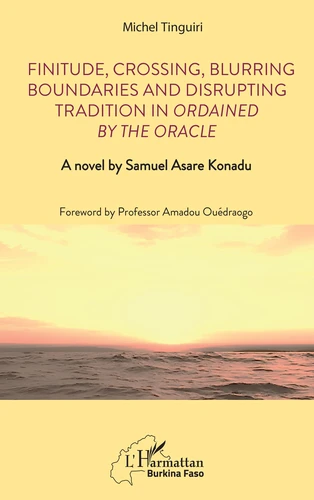Finitude, Crossing, Blurring Boundaries and Disrupting Tradition in Ordained by the Oracle. A novel by Samuel Asare Konadu
Par :Formats :
- Paiement en ligne :
- Livraison à domicile ou en point Mondial Relay indisponible
- Retrait Click and Collect en magasin gratuit
- Réservation en ligne avec paiement en magasin :
- Indisponible pour réserver et payer en magasin
- Nombre de pages154
- PrésentationBroché
- Poids0.186 kg
- Dimensions13,5 cm × 21,5 cm × 0,9 cm
- ISBN978-2-336-41968-8
- EAN9782336419688
- Date de parution04/01/2024
- CollectionHarmattan Burkina Faso
- ÉditeurL'Harmattan
- PréfacierAmadou Ouédraogo
Résumé
The book analyzes the novel Ordained by the Oracle through socio-cultural, symbolic and anthropological frameworks. It examines funeral rituals, the duality between the visible and invisible worlds, and the role of the oracle, spirits and ancestors in society. The study sheds light on the notions of space, time, myth and reality in the Akan society. It demonstrates that literature crosses disciplinary boundaries and can be seen as a form of anthropology.
The analysis will be of interest to students and researchers in African studies, literature, religion, culture, sociology, and anthropology.
The analysis will be of interest to students and researchers in African studies, literature, religion, culture, sociology, and anthropology.
The book analyzes the novel Ordained by the Oracle through socio-cultural, symbolic and anthropological frameworks. It examines funeral rituals, the duality between the visible and invisible worlds, and the role of the oracle, spirits and ancestors in society. The study sheds light on the notions of space, time, myth and reality in the Akan society. It demonstrates that literature crosses disciplinary boundaries and can be seen as a form of anthropology.
The analysis will be of interest to students and researchers in African studies, literature, religion, culture, sociology, and anthropology.
The analysis will be of interest to students and researchers in African studies, literature, religion, culture, sociology, and anthropology.





